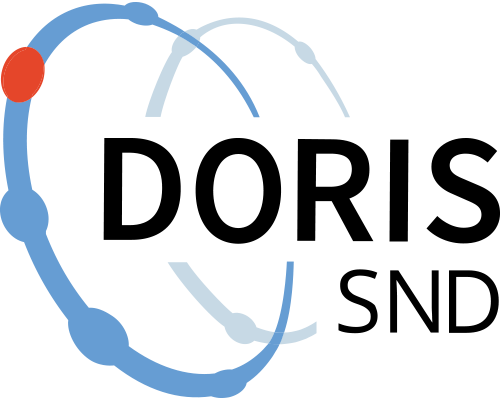Ett initiativ att utveckla goda år i Sverige: Frekvensord - Påstående handlingsfrihet versioner A, B, C
https://doi.org/10.5878/vq4v-dy73
Detta dataset är en del av ett projekt som utvecklar ett mått kallat ”Goda År”, för förhållanden som återspeglar den svenska kontexten. Måttet baseras på sex frågor som mäter livskvalitet i termer av handlingsfrihet, och kommer främst att användas vid ekonomisk analys av insatser för folkhälsa och välfärd.
Data omfattas av enkätsvar från respondenter om deras upplevda handlingsfriheter, inklusive ett antal bakgrundsvariaber. För att undersöka hur beskrivningen av handlingsfriheten påverkade svaret, så togs enkäten fram i tre olika versioner där handlingsfriheterna formulerades olika omfattande. Till exempel, när det gäller att bedöma hälsans kvalitet, varierade frågan mellan de olika versionerna av enkäten enligt följande:
- Version A: ”Jag har ett bra allmänt hälsotillstånd (psykiskt och fysiskt) som alltid tillåter mig att arbeta eller ägna mig åt det jag vill.”
- Version B: "Jag har ett bra allmänt hälsotillstånd (psykiskt och fysiskt) som nästan alltid (säg minst 95% av alla dagar) tillåter mig att arbeta eller ägna mig åt det jag vill.
- Version C: "Jag har ett bra allmänt hälsotillstånd (psykiskt och fysiskt) som för det mesta tillåter (säg minst 90% av alla dagar) mig att arbeta eller ägna mig åt det jag vill."
Studien genomfördes i juni 2020. En webbaserad enkät distribuerades till ett urval av 500 individer i Sverige från en kommersiell webbpanel (Cint), efter kvot-stratifiering utifrån befolkningens ålder, region, utbildning och kön. Uppgifterna samlades in anonymt med en PHP-baserad webapplikation för enkäter (limesurvey version 4.2.2, https://www.limesurvey.orgÖppnas i en ny tabb) som drivs från en server vid Umeå universitet.
Att ta stora stickprov från kommersiella webbpaneler är administrativt sett enklare och snabbare än andra metoder som till exempel att direkt ta ett allmänt befolkningsstickprov. Även svarsfrekvensen kan vara högre och datahanteringen enklare. Å andra sidan är det mindre transparent hur studierekryteringen gick till och gruppen av webbpaneldeltagarna kanske inte är representativ för befolkningen. Dessa begränsningar borde behållas i minnet när man ska analysera dessa data och tyda våra resultat.
Den slutliga formuleringen av en handlingsfrihet gjordes mot bakgrunden av svarsmönstret i enkäten, men det beaktades också normativa överväganden som till exempel kommer till uttryck i lagar eller policys. Om det var obetydliga skillnader i svarsmönster mellan de tre alternativen valde vi alternativ A.
Den vanligaste metoden i svenska kommuner för att analysera folkhälso- och välfärdsinsatser är att mäta kostnader och eventuella minskande kostnader (”besparingar”). Detta medför en risk att interventioner som kortsiktigt ger mätbara besparingar prioriteras framför sådana som på lång sikt ökar välfärden. ”Goda År” ger en möjlighet att systematiskt mäta förändringar i välfärd till följd av interventioner, och till exempel jämföra värdet av förbättrade skolor med värdet av rehabilitering av missbrukare.
Att mäta livskvalitet i form av handlingsfriheter, eller kapabilitet, föreslogs av Amartya Sen. Metoden undersöker vad individer kan göra eller vara i stället för att mäta livskvalitet i termer av välstånd eller lycka. Amartya Sen belönades för sin forskning 1998 med Sveriges Riksbanks pris i ekonomisk vetenskap till Alfred Nobels minne.
För att välja ut handlingsfriheter för studien genomförde vi en s.k. delfiprocess med deltagare från framför allt ideella organisationer. Utgångspunkten var de tio handlingsfriheter som en svensk offentlig utredning 2015 föreslog (SOU 2015:56). Genom delfiprocessen blev sex av de tio handlingsfriheterna utvalda: ekonomi och bostad, nära relationer, hälsa, sysselsättning, säkerhet, samt medborgerliga och politiska rättigheter.
Dokumentationsfiler
Dokumentationsfiler
Citering och åtkomst
Citering och åtkomst
Tillgänglighetsnivå:
Skapare/primärforskare:
Forskningshuvudman:
Data innehåller personuppgifter:
Ja
Typ av personuppgifter:
Indirekt identifiering är eventuellt möjligt.
